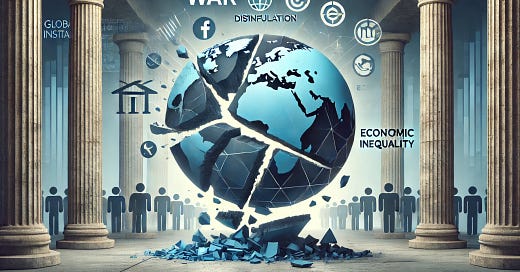Elite Failure: A Reckoning for Globalization and Technology
The second Trump term is just part of a global unraveling that extends from France to South Korea.
With Techonomy 24 in the rearview, I’m focusing on the upcoming World Economic Forum in Davos and planning our next Groundbreaking Women Conference on March 18th. And yet, I can’t shake the feeling that things have gone terribly wrong with the world, and those of us gathering for conferences are part of the problem.
The war in Ukraine has shattered decades of European security norms, drawing NATO and Russia into a dangerous proxy conflict. The war in Gaza has reignited Middle East tensions, fueling extremism and deepening regional divisions while highlighting the fragility of international efforts at diplomacy. Compounding these crises is a global migration crisis, as millions flee conflict, climate change, and economic despair, overwhelming borders and stoking xenophobic backlash in host nations. Income inequality, exacerbated by automation, wage stagnation, and tax avoidance by multinational corporations, has eroded public trust in institutions and fueled the rise of populist movements. Meanwhile, social media platforms initially hailed as tools for democratization, have become engines of disinformation, amplifying polarization and undermining the legitimacy of democratic processes worldwide. Together, these forces threaten geopolitical stability and the foundation of a cooperative international order.
As the dust settles on a world seemingly spinning out of control, it’s clear that we are witnessing the reckoning of globalization and technological transformation—a reckoning driven not by the unstoppable forces of innovation or market efficiency but by the profound failure of elites to manage their impact on society. The collapse of France’s government, South Korea’s brief flirtation with martial law, and the impending return of Donald Trump to the White House are not isolated incidents. They are symptoms of a broader crisis: the inability of leadership to adapt to the world they helped create.
For decades, globalization was sold as an unalloyed good—a rising tide that would lift all boats. Free trade, interconnected supply chains, and borderless commerce promised everyone prosperity. Similarly, technology was heralded as the great equalizer, breaking down barriers and democratizing access to information and opportunity. Yet, the reality has been far more complicated. While these forces have generated unprecedented wealth and innovation, they have also hollowed out local economies, exacerbated inequality, and concentrated power in ways destabilizing the global order.
Consider France. Long a bastion of stability in Europe, it now faces a leadership vacuum after Prime Minister Michel Barnier’s government collapsed under the weight of public discontent. At the heart of the crisis is an electorate enraged by austerity measures and a political elite that failed to anticipate the backlash. The Yellow Vests protests of 2018 should have been a wake-up call. Instead, leaders doubled down on policies that disproportionately benefited the wealthy while neglecting the needs of rural and working-class citizens. Unsurprisingly, far-right and far-left populists are now circling like vultures over the remnants of a centrist consensus.
Meanwhile, in South Korea, one of the world’s most technologically advanced democracies, President Yoon Suk Yeol’s declaration of martial law this week was a stunning regression. The official justification—threats from “pro-North Korean forces”—does little to obscure the deeper issue: a society grappling with economic stagnation, generational divides, and the unsettling impact of automation and AI on jobs. Even a brief suspension of civil liberties has eroded trust in institutions, fueling protests and calls for impeachment. It is a reminder that even the most modern democracies are not immune to authoritarian impulses when leaders feel the ground shifting beneath them.
And then there is the United States. The return of Donald Trump to the presidency, fueled by resentment against globalism and the so-called coastal elites, signals a rejection of the technocratic consensus that once defined American politics. His administration will likely double down on isolationist policies, further straining the fragile international order. For all the talk of bringing jobs back to America, his first term failed to address the structural disruptions wrought by technology—a failure that, if repeated, will deepen the polarization and resentment that threaten democracy itself.
The common thread in these crises is clear: elites have failed to manage the dislocations caused by globalization and technological transformation. They underestimated the social cost of outsourcing jobs and automating industries, and they overestimated the resilience of democratic institutions to withstand the pressures of inequality and polarization. As a result, we live through a moment of profound instability, where populism thrives, autocrats are encouraged, and faith in democratic norms erodes.
This is not just a political failure; it is a leadership failure. The question now is whether the leaders of today—and tomorrow—can rise to the occasion, bridging divides and forging a vision of globalization and technological progress that serves everyone. The alternative is a world where unrest becomes the norm and democracy fades into history. If that happens, the elites will have no one to blame but themselves.
On to Davos?
The Science of Work: Navigating the AI Revolution
Microsoft Chief Scientist Jaime Teevan delves into the emerging challenges of hybrid work environments, focusing on the balance between productivity measurement and employee well-being, a theme central to her research.




